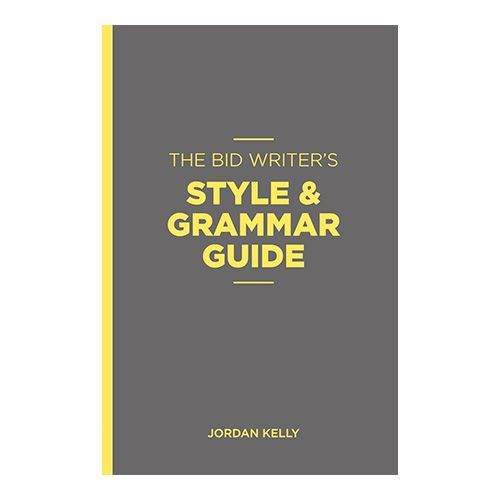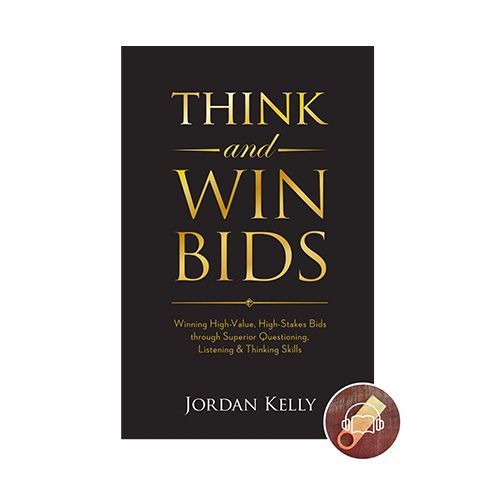CATEGORIES:

Here are the core tenets of good bid management. Bid management, that is, that eliminates to the greatest degree possible, health-compromising stress from the bidding process. (More on that in a future article.)
They include but (arguably) are certainly not limited to:
1) The clear and careful assessment of the advisability of pursuing the business in the first place.
Proceeding with a bid you’re not qualified for, not prepared for – or that you shouldn’t go for, for some other reason – is setting yourself up for huge stress and no pay-off.
I’ve seen numerous companies insist on investing huge resources in a bid they didn’t have a chance of winning. Their pre-sales engagement was inadequate (or non-existent). Their insider knowledge of the prospect organisation was insufficient. They had no idea of the competition’s standing with the prospect. And management couldn’t even truthfully say it believed the company could do the best job for the client in question.
Be realistic.
2) Ensuring an early start. A very early start.
Steal the lead on your competitors. Give yourself ample time – and then some – to explore all avenues of research – both primary and secondary / direct and indirect.
There are some industries in which, if a bidder hasn’t researched the contract/project, the client organisation and the political backdrop in detail at least six months before the release of the Request for Proposal, that bidder is massively behind the eight-ball . . . and should seriously consider the wisdom of proceeding.
Certainly, once the client’s tender documentation is released to market and the probity curtain comes down, a bidder has lost all real opportunity in terms of any information still to be gleaned from the client or associated parties. That is, unless that bidder is happy for its potential strategy to be flagged to competitors when its questions are published on the relevant pages of the client’s website for all to read – along with the client’s answers. (Not that that’s the forum for asking anything deep and meaningful, anyway.)
3) Undertaking a comprehensive recap of the debrief associated with the bidder’s most similar, recent EOI / RFP / RFT responses – along with any that may have been submitted to the client in question at any point.
Learning from your mistakes is one of the best ways to ensure against a repeat performance.
4) Adequate time devoted to pre-bid strategy sessions.
Bidders that whip through these sessions, with silly little 45-minute segments for critical investigations such as competitor analysis, are either naïve, arrogant or both. Probably both. (It’s a great way to give your competitors the advantage, though.)
5) Careful advance consideration of the broad topic areas requiring coverage in strategy workshops, and placement of the right people in the room (and all of the right people).
If you don’t have the right knowledge sources at your bid strategy planning sessions, you’ll either end up with an uninformed (or worse, a misinformed) strategy, or you’ll have to run additional sessions.
And there goes your production schedule, right there.
6) The running of a tight ship at planning sessions.
If a bid leader or bid manager caves into the insistence that bid team members can’t survive an eight-hour workshop without their mobiles and their laptops, they deserve the lack of attention that is absolutely 100 percent guaranteed to result.
Similarly, if they allow people to wander in and out of the room at will and cruise back from breaks as they please. At least consider those members of the team who are treating the exercise seriously and respect their commitment by ensuring that others don’t compromise the quantity and quality of the session’s outputs.
Insufficient and poor quality outputs = poor quality strategy = poor quality content = bid manager running around like a headless chook at the end of the production schedule trying to make a silk purse out of a sow’s ear.
7) Adherence to schedule in the writing phase through reliance upon a well-researched, well-considered, comprehensive strategy blueprint.
Similarly to the above point, one of the primary reasons for the stressed condition of those responsible for chiseling the final production into shape, is that they are faced with a strategy-less and waffly piece of “brochureware”, in place of (what should have been) well-thought-out, well-guided, co-ordinated, comprehensively and accurately answered written response sections.
8) Putting the right people onto the right job.
In Think & Win Bids, I write about the four “MOs” (Modus Operandi) or operating style categories that I observe bid team members falling into.
There are some “MOs” you simply wouldn’t assign with a certain task if you want the job done with any deal of competence and enthusiasm, and there are others who will relish the very same assignment.
There are others who will fall down the rabbit hole and forget how to get back up it, and others who know how to shoot a straight arrow at the same target. And yet others who will do a great job if you need something fast and you’re OK with “shallow” as a trade-off, and others who’ll excel at hard, deep research – but you can forget “fast”.
A sharp bid manager will identify and capitalise on the natural strengths of his or her people to ensure the bid stays on schedule, and that a quality output is evolving.
9) Shunning the ‘war room’ concept.
If you’ve been following my work, my teachings, and my writings for any real length of time, you’ll know I take every opportunity to get this point across.
No apologies for the stuck groove here:
If focus is the bedrock of productivity, why would you expect anyone (particularly anyone who’s not a writer for a living) to maintain the degree of concentration required to produce quality copy, whilst sitting in the cross-flow of a variety of different conversations, mobile phone calls, and constant miscellaneous interruptions?
If all seasoned writers / authors (certainly all that I know or have studied) can work only in solitude, why on earth would the requirement be any different for someone who doesn’t even write for a living?
10) Ensuring the developing bid documentation is regularly reviewed by the individuals who have had peak responsibility for the production, and the signing off, of the guiding bid strategy.
If you don’t want to be summoning all hands to deck to re-write the bid documentation at the 11th hour (i.e. when senior management sees it and questions its poorly reflected strategy), have those with whom the “strategy” buck rests, involved at critical junctures throughout the process.
11) The allocation in the production schedule of plenty of time for editing and re-writing.
Similarly to Point 7, if the work of seasoned writers and famous authors is given public airing only after numerous re-writes and multiple rounds of editing, why would a lesser degree of review be required for non-professional writers?
12) Thoughtful and comprehensive debrief preparation.
Learn everything you can from your just-concluded bid process and your just-submitted bid documentation, in order to identify all the areas in which you can improve both in the next bid.
THINK AND WIN BIDS
Winning High-Value, High-Stakes Bids through Superior Questioning, Listening & Thinking Skills
(Book)
The capacity and willingness for a bid leader to think deeply, logically, strategically and client-centrically is a key differentiator between those who can sustain a high win rate and provide much-needed leadership in new-business pursuits, and those who flounder in such a role.
THE BID WRITER'S STYLE & GRAMMAR GUIDE

(Book)
Bid writing requires the highest degree of grammatical diligence, and a consistent style.
To a large extent, your organisation’s credibility hangs on the quality of your writing and the standards it reflects.



